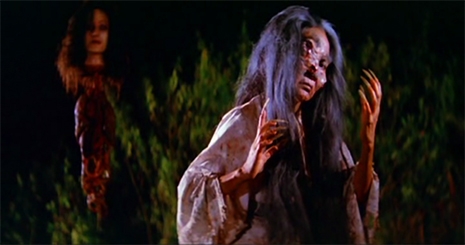
The films released by the Mondo Macabro label are certainly some of the most bizarre movies in existence. Many of these diverse horror, fantasy, and erotic films had never been screened outside of their home countries before being rescued and preserved by these cult curators. The label’s aesthetic, if there is one, seems to favor films with wild visual content resulting from either the film-makers’ budgetary constraints or the unconventional elements of story-telling specific to their various foreign cultures. There are few DVD companies as reliable as Mondo Macabro: even the “bad” films they release are fascinating for being so goddamn out there.
In 1994 Mondo Macabro’s Pete Tombs co-wrote the definitive guide to European exploitation and horror films, Immoral Tales: European Sex & Horror Movies, 1956-1984. This reference lead to Tombs becoming a producer, with Andrew Starke, of the BBC documentary series Eurotika!. Tombs followed up with the book Mondo Macabro: Weird and Wonderful Cinema Around the World, which covered the fantastically strange films of Hong Kong, the Philippines, Indonesia, India, Turkey, Brazil, Argentina, Mexico, and Japan. This crucial tome inspired another BBC documentary series and eventually a DVD label of the same name. Tombs and Starke have been releasing DVDs on the Mondo Macabro label since 2003’s release of the 1978 Mexican horror film, Alucarda.
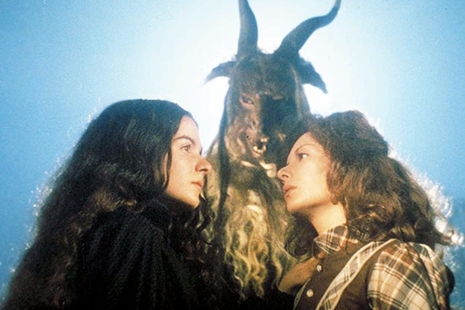
Alucarda
Tombs scours the planet for the rarest and weirdest exploitation and horror films. In some cases, these films are literally being saved from the garbage dump, with Tombs tracking down the only surviving elements, which are cleaned up as much as possible and supplemented with bonus archival and documentary materials. Mondo Macabro’s DVD releases are an evident labor of love.
We recently caught up with Pete Tombs to talk about his work:
Dangerous Minds: I’d like to start by going back to 1994 and your Immoral Tales book. This book became one of the definitive guides for film buffs with an interest in unusual films in those pre-Internet and DVD days. It had a spot on my bookshelf right next to Incredibly Strange Films and The Psychotronic Encyclopedia of Film. How difficult was it to research your subject matter at that time?
Pete Tombs: It was REALLY difficult! Obviously I’d been watching films for a long time before starting work on the book and so there were my memories and occasionally notes made years before to fall back on, but generally finding copies of the more obscure films was… well, let’s say “challenging”! Most of the research for Immoral Tales was done in a period prior to the existence of the world wide web as it exists today so we relied almost entirely on personal contacts and snail mail to exchange information and tapes. There were also a few books, mostly in languages other than English, and a lot of journals and fanzines that dealt with our areas of interest. In the back pages of zines like Pyschotronic you used to find full page ads from tape traders or sellers, usually pages filled with film titles in tiny typeface that you had to pore over using a magnifying glass. You then had to cross reference the titles to find out what was actually on offer as different releases of the same films often had alternate titles, particularly if they were foreign films. But gradually you got to see things and patterns started to emerge.
DM: How did Immoral Tales lead to the Mondo Macabro book, and subsequently the Eurotika TV series, followed by the Mondo Macabro TV series?
PT: Cathal Tohill and myself put Immoral Tales together, originally for publisher Paul Woods. We ended up publishing it ourselves. After it came out Paul suggested to me that a similar book on Asian cinema might be of interest. I thought about it and realized very quickly that my knowledge of that area of film was limited but I reckoned that by taking a more global approach and intending the book to be a brief introduction to exploitation industries outside Europe and the US, I might be able to put something together.
Andy Starke and myself had already made the Eurotika! Series for UK Channel 4, so we made a video pitch to them of the Mondo series backed up by the book and it went on from there. It was quite an adventure going to all those countries and trying to track down people to film, some of whom had never been interviewed before but I’m glad we did it. Some of those interviews – like the one we did with Barry Prima in Jakarta were kind of surreal. He didn’t seem to be at all interested and could barely come up with answers to most of the questions. Finally he admitted that he thought his films were all shit and that he’d only turned up so he could see who these idiots were who’d come all the way from the UK to ask him about them. What a guy! I still love his films though, despite his best efforts to persuade me otherwise.
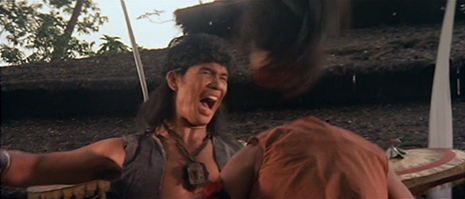
The Devil’s Sword.
DM: At what point did it seem a logical next step to create a label to release the films you were researching and reporting on?
PT: I’d been running video companies for a few years by the time we started the Mondo label. We’d built up a lot of contacts over the years, so we knew who to talk to and (more importantly!) how much to spend. We started in the UK and it was Andy Starke’s idea to set up a US operation.
DM: Mondo Macabro has a deserved reputation among fans for quality. I’ll sometimes pick up a movie on Mondo Macabro without prior knowledge, just because I “know what I’m getting” with the label. For titles that are considered “trash cinema,” great pains have been taken to restore prints and add as much supplemental materials as possible. Is there ever a point where “it’s not worth it”? Like do you ever think to yourself, “this movie isn’t that great, why are we knocking ourselves out?”
PT: Ha! I often ask myself “Is it worth it?”… especially when we get bad reviews. One of my personal favorites and a film I’ve been obsessed with for years was Sadist With Red Teeth. That was a real labour of love. And it got horrible reviews! Although I still think it’s a great film. I don’t think we’ve ever put out anything that we didn’t believe delivered the goods in some way. I know these films aren’t to everyone’s taste, and people have differing views about them, but I believe all films deserve a certain amount of respect. Who’s to say what will matter in the future? If you look at contemporary reviews for Night of the Living Dead the general consensus was that it was low grade garbage. Now it looks like one of the most important films of its era and is in the MOMA permanent collection.
When the great Japanese director Suzuki Seijun came to London years ago, he was asked which of his films he thought should be preserved for posterity. He replied that either all films should be saved or none at all. Which means, of course, that we should save them all. Film preservation is one of the most important things in this industry and it literally gives me sleepless nights when I come across stories of negatives being lost or destroyed. And, believe me, it’s still happening today. It’s too depressing, and all down to people thinking certain films aren’t “good” or “important”. No-one can really “own” films, They belong to the future. All of them. Ars longa, vita brevis.

The Sadist With Red Teeth
DM: There’s a certain “wildness” I associate with the films you’ve released that I think can be attributed both to the film makers’ attempting to titillate audiences beyond the means of their minuscule budgets, as well as the alien strangeness of foreign culture and its storytelling methods. Is there a Mondo Macabro aesthetic?
PT: Just whatever floats our boat. When we see it, we know it. It’s an emotional thing. From art films Like Crazy Love and Born of Fire to wacky creations like Mystics In Bali or Blood of the Virgins. We love them all with equal passion. That’s the key, there has to be some love there, both from ourselves and the film makers. If we thought that a film was made for purely cynical reasons by a film maker who despised his audience, we’d probably not be interested. Or maybe we’d be VERY interested! I’d have to see the film to know. The key is – does it set your pulses racing, does it give you goose pimples, does it give you that sense of “anything’s possible”? That’s a real film, wherever it comes from and whatever it’s about. It has to excite you. Chin stroking contemplation is not something we expect from Mondo Macabro films. Hate them or love them, fine; but if it’s just “Blah…”, then what’s the point?
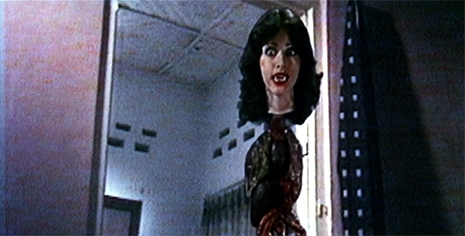
Mystics in Bali
DM: I confess I haven’t seen every release on the label, but I’ve seen most of them. Lady Terminator is probably my favorite. That movie is utterly ridiculous. Do you have a personal favorite? Also, does any title stand out as being the most difficult/worth it to accquire?
PT: I guess our favourites are always the ones we’ve just released. And I really do think Tango Of Perversion, a Greek film we’ve just put out, is a great exploitation film, It really pulls out all the stops and doesn’t hold back on anything. Good taste goes out of the window with that one. If someone doesn’t like Tango of Perversion and The Wife Killer, they are probably not the right audience for Mondo Macabro.
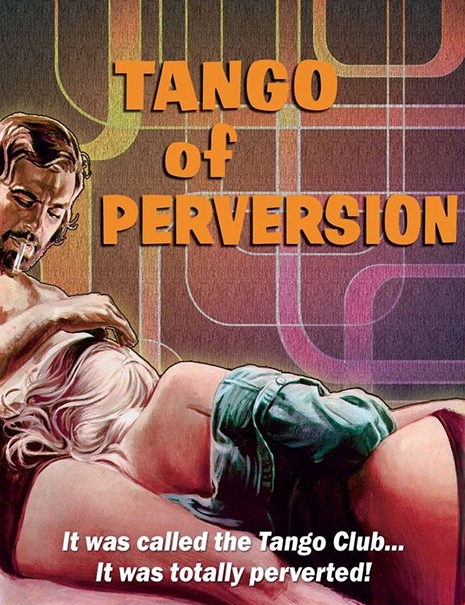
DM: I’ve noticed that recently Mondo Macabro has been releasing some Greek Exploitation (or Grexploitation) titles. Back in the pre-Internet and DVD days, when I was buying a lot of overpriced third-generation VHS dubs of foreign gore and exploitation films from American “bootleg distributors” like Video Search of Miami or Luminous, it seemed a lot of uncut prints were sourced from Greek VHS releases. What is it with the Greeks and exploitation?
PT: It’s true that back in the days of tape trading a lot of the more obscure titles used to turn up with Greek subtitles. The Netherlands was another great source of rare films. I think it was just a case of economics, as with so many things. When films were being sold to video companies during the 1980’s home entertainment boom, Greece was always the last destination on sales agents’ lists and they didn’t expect much money for the rights, particularly for the more obscure, lower budget films at the back of their catalogs. Plus I think Greek audiences like exploitation cinema. They didn’t get much of it from their own country so they were more open to foreign films giving them what they wanted. I think the video industry there exploded in the 80s and there were a lot of distributors putting out anything they could get, which is why some really rare films only exist in Greek subtitled versions.
DM: Do you have an overall mission that drives you in what you seek out and release through Mondo Macabro?
PT: Just to keep it interesting and maybe provoke and challenge the mainstream a little bit. Too many films these days are safe and over sanitized. If we come across a film that we like, then we feel sure there must be others out there who will too. It’s like falling in love with someone. When it happens, you’ll know it. If not, just pass on.
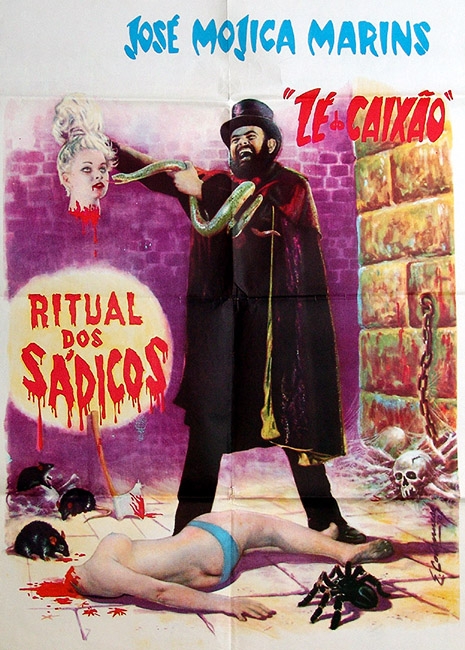
DM: What’s the label’s best-selling title, and what’s the worst? And were you surprised?
PT: Biggest success: Alucarda. It was our first US release and initial sales were dreadful. We thought it was game over before we’d even started! But fortunately, people caught on to the title and it has continued to sell consistently over the years.
Biggest flop (and biggest surprise): Clonus. It’s a great film and I think the interview we did with director Robert Fiveson is one of our best ever, mostly because he’s such a colorful character with lots of great stories to tell. The surprise came on account of the legal storm that arose over the connections between low budget Clonus and the huge budget The Island, the Scarlett Johansson film from 2005. There were legal repercussions and the story hit the mainstream press in a big way. We were all convinced that this would result in equally big sales. But nope, it didn’t. We even pressed it up with a different cover to cash in… but it still didn’t sell. We put it down to the film having been given a drubbing on MST3K and so no-one could take it seriously after that. A shame as it’s a really interesting and fun film and I’d love for Robert to have made more features.
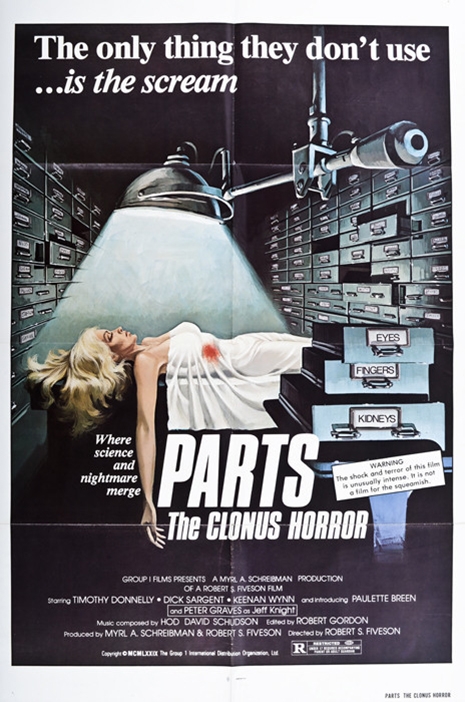
DM: Are there any particular titles that “got away” or have source materials too incomplete for a Mondo Macabro release? Is there any particular film you wish YOU could have been the one to put out?
PT: Ah, there’s lots that fit into those categories. We’ve been doing this a long time one way or the other, so there’s many, many films that we’ve been after, sometimes for years, that later come out via other companies – often companies who didn’t even exist when we started chasing those particular films. But that’s business I guess. We don’t have a lot of money and when big companies come along paying unrealistic amounts for films, there’s not much we can do about it. But we know they will eventually move on. These films have a small niche audience and they don’t return huge investments, so you have to love them for what they are to even bother in the first place. They’re not great money spinners. Of the ones that proved too problematic, A Gun for Jennifer comes to mind. That was one that slipped through our hands despite our best efforts and it’s a film that deserves to be seen as its makers intended.
DM: What future projects are you most excited about?
PT: We’ve got Fulci’s Lizard in a Woman’s Skin coming up on Blu Ray and that’s a favorite film of ours—so thrilled to be working on that. Then there’s The Spider—a Latvian sex/horror film from 1991. It’s the ONLY Latvian sex horror film, so quite a unique beast. And a great film too. Obscure, foreign and a great film. That’s the Mondo trifecta, so how can we miss??
Here’s a trailer for several films released by Mondo Macabro. Warning, not at all safe for work: